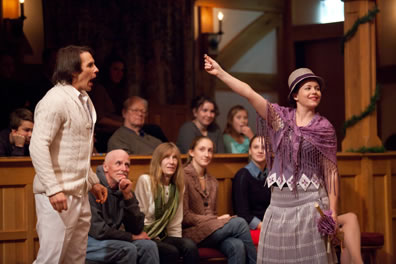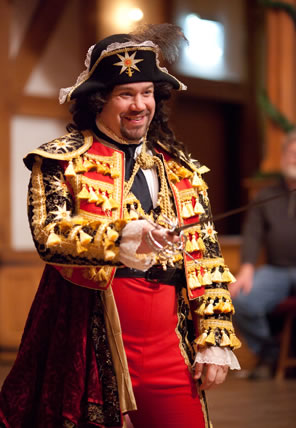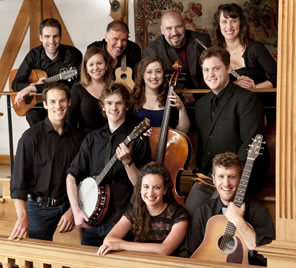Love’s Labour’s Lost
Love’s Labours Win
American Shakespeare Center, Blackfriars Playhouse, Staunton, Va.
Saturday, September 8, 2012, C–6&7 (center stalls)
Directed by Jim Warren

The King of Navarre (Patrick Midgley) reacts to Rosaline (Lexie Helgerson) as she reveals the mis-given love token in the American Shakespeare Production of Love's Labour's Lost at the Blackfriars Playhouse. Below, Rick Blunt as Don Armado. Photos by Lauren D. Rogers, American Shakespeare Center.
Of all the witty wordplay and romantic poetry in Love’s Labour’s Lost, the play’s most magical line just might be a simple observation by Berowne at the end. When he and his companions are told they must wait a year and a day before the ladies they love will grant their suits, Berowne says “That’s too long for a play.” Shakespeare is here winking at his audience, and the American Shakespeare Center’s Tempt Me Further Tour troupe picks up on that clue and turns this Elizabethan wordfest into a modern funfest, a jocund gathering of them and us together creating a great thing called theater.
I love this play, but I’ll be the first to admit its language is way too obtuse for me in places. Obviously, this can be a huge obstacle in a play that derives most of its humor from its language in the way of puns, sophisticated put-downs, and characters’ unchecked verbosity.
However, the language is not an obstacle in this production. Director Jim Warren’s judicious trims of the text help, and the accessible setting serves the script well, too. Based on the costumes designed by Victoria Depew, the action takes place in the 1920s, with the princess and her ladies-in-waiting wearing flowing, bejeweled flapperish dresses, the king in a white sportsman’s sweater bearing a shield-shaped badge on his breast, and his fellows in three-piece suits. This Navarre could be a Gatsby country estate set on the outskirts of Dayton, Tennessee. Moth scampers about in overalls, Costard is a Hee-Haw bumpkin in tidewater pants, vest, way-too-short polka-dot tie, and fedora, and the Forester just stepped in from Deliverance. With Holofernes in sweater vest and academic cloak, Dull looking like a Keystone cop, and Don Armado dressed as a bullfighter, Depew’s visual characterizations put Shakespeare’s language characterizations in easily identifiable context. Warren also keeps his cast focused on their characters’ purpose, and the production’s ultimate goal, of providing whimsical fun for the audience.
And what a collection of characters. Love’s Labour’s Lost contains some of Shakespeare’s most singular creations. There’s the hilariously funny, such as the excessively romantic Spaniard Don Armado and the excessively arrogant schoolmaster Holofernes; these are two of my favorite characters in the canon for the way they stroke their own egos with superfluous synonymy. There’s the subtly comic, such as the well-meaning but naïve King of Navarre and the wittily wise Princess of France. And there’s that lawyer of love, Berowne.
What a cast, too. We’ve been fortunate this year to see some top-to-bottom brilliant ensembles, such as the ASC Renaissance Season company and the casts of New York Classical Theatre’s Twelfth Night and Oregon Shakespeare Festival’s All the Way, and again we are treated to a company with every cylinder firing at full force (the Tempt Me Further Tour troupe was doing a Blackfriars Playhouse preview run before heading out on its national tour).
With this play the company gets a broad canvas on which to display its talents, thanks to the doubling of so many key roles. Stephanie Holladay Earl is the elegant Princess dispensing her wit prettily, and she is the urchin page, Moth, guffawing his jokes with fist pumps. Lexie Helgerson is the self-assured Rosaline flirtatiously teasing Berowne, and she is the stiff parish priest Nathaniel, prim, proper, and celibate. Bridget Rue is the quiet, reserved Katherine, another of the Princess’s ladies-in-waiting, and she is the overly overtly sexual Jaquenetta, lying on her back making love to Berowne’s words as Nathaniel reads his miscarried sonnet. David Millstone is the dullish Dumaine and the educator extraordinaire Holofernes. Jacob Daly is the hyperactive Longaville and the hillbilly Forester, and Seth McNeill is the confident confidante Boyet and the stooped-shoulder, dimwitted Dull who, following Shakespeare’s direction, stumbles over the name Signior Armado, but in a clever updating we can hear him mistakenly read the name as “Signior Armadillo” and “Signior Ahmadinejad.” From scene to scene, these actors sometimes barely have a line in which to change costume and character—Holladay Earl and McNeill in particular must have a bottle of polyjuice potion at hand to translate so quickly and effectively.
The final scene with the presentation of the Nine Worthies features the royal courts and country folk at the same time—a total of 14 characters played by a cast of 11. Warren and company employ no theatrical metaphor or clumsy dual playing; rather, the double-role actors unobtrusively slip off stage as one person and return the next minute as another, do their Worthy and leave, coming back again as their first person in time for their next line.
It works because this production does not try to aim for any higher concept than entertaining its audience. Indeed, the play’s success comes from embracing that mission wholeheartedly at every turn, even before the play begins. Modern music is a mainstay of ASC productions (in addition to acting chops, this cast features skilled singers and musicians, too), and the music is integral to the play’s overall theatrical experience. The preshow concert contains such thematically chosen songs as Mary Chapin Carpenter’s “Shut Up and Kiss Me,” Elvis Presley’s “A Little Less Conversation,” and a mash-up of “My Guy” and “My Girl.” During the intermission, the cast performs another fitting mash-up, ’N Sync’s “Tearing Up My Heart” and Spice Girls’ “Wannabe.” Snippets of appropriate songs pepper the play, such as Sam Cooke’s “Don’t Know Much about History,” Carol King’s “Will You Love Me Tomorrow,” and the Monotones’ “Who Wrote the Book of Love.” The Navarre fellows call on a romantic guitar with a snap of their fingers to accompany the reading of their sonnets and, though disguised as Muscovites, they greet the Princess’s train by singing the Backstreet Boys’ “I Want It That Way” and snippily depart with ’N Sync’s “Bye Bye Bye.”
One half of any theatrical experience is the audience. It’s too often a forgotten half, but this cast involves the audience any way it can. The great four-way reveal scene has each of the king’s courtiers hiding amid the audience. Patrick Midgley as the King speaks his sonnet directly to a person sitting on one of the on-stage gallant stools (and in the production we saw, the elderly woman receiving his love words feigned infatuation so well, Midgley led the audience in applauding her). Patrick Earl as Berowne effectively captures the audience’s confidence with his speeches, and his Cupid soliloquy is one of the play’s highlights as Shakespeare’s archaic mythological references take on modern connotations (I never before realized how funny that speech can be). Costard the clown can be the play’s most obtuse character but, in his country loll and W.C. Fields mannerisms, Andrew Goldwasser makes him laughable as well as lovable.
 Then there’s Don Armado. “Rick is ridiculous,” I wrote in my notes, and that is truly a compliment to Rick Blunt, who is this generation’s Will Kemp. Warren’s genius was in casting his company’s Kemp not as Costard (more of a Kemp-type role) but as the overblown Spaniard wearing too-tight matador britches and, when presenting Hector as the Ninth Worthy, too-short toga. Using an extravagant Spanish accent and walking with flourishing gestures, this Don Armado’s very stage presence is as overblown as his passion and language. Heck, that’s the case even when Blunt isn’t actually on the stage: as his two letters are read out loud, the King and Boyet lip-synch to Blunt’s flamenco-like voice coming from backstage. It’s a funny device in and of itself, but it also hammers home the absurd language of the letters, one of Shakespeare’s best pair of comic set pieces.
Then there’s Don Armado. “Rick is ridiculous,” I wrote in my notes, and that is truly a compliment to Rick Blunt, who is this generation’s Will Kemp. Warren’s genius was in casting his company’s Kemp not as Costard (more of a Kemp-type role) but as the overblown Spaniard wearing too-tight matador britches and, when presenting Hector as the Ninth Worthy, too-short toga. Using an extravagant Spanish accent and walking with flourishing gestures, this Don Armado’s very stage presence is as overblown as his passion and language. Heck, that’s the case even when Blunt isn’t actually on the stage: as his two letters are read out loud, the King and Boyet lip-synch to Blunt’s flamenco-like voice coming from backstage. It’s a funny device in and of itself, but it also hammers home the absurd language of the letters, one of Shakespeare’s best pair of comic set pieces.
Shakespeare, however, never wrote any of his plays on a single emotional plane, and Warren’s troupe recognizes and respects that, even in the fun staging of this Love’s Labour’s Lost. Rosaline and Katherine get into a bit of witty cattiness begun when the former makes a disparaging reference to the latter’s dead sister, and Helgerson and Rue carry out this dialogue with such testiness that the Princess physically steps between them (by contrast, the parallel cattiness among the men arguing over the merits and demerits of their respective loves is played solely for laughs). When we come to Shakespeare’s shocking ending, the sudden dramatic weight of the play falls on the Princess; Holladay Earl—who in last year’s tour played Hermione in The Winter’s Tale so exquisitely—pulls off this tricky mood shift with absolute assuredness. In light of this switch from sunny comic romp to a play that “begins to cloud,” the charge Rosaline lays on Berowne—to spend a year of bringing comedy into the tragic settings of hospitals and hospices—takes on added significance.
“All the world’s a stage,” one of Shakespeare’s characters would famously say in a later play. Another of his characters would implore his audience to believe the stage to be all the world. In this Love’s Labour’s Lost, the characters’ stage and our world meet and mingle for two-plus glorious hours. After the ladies enforce their “year and a day” sentence on the gentlemen, and after the country folk (in this production, the whole cast) sing about the owl and the cuckoo in a musical denouement, Don Armado speaks the play’s last, typically obtuse line: “The words of Mercury are harsh after the songs of Apollo. You that way: we this way.” But Blunt’s Armado is emphatically clear in his meaning as he addresses this line directly to the audience and points which way for whom. And so the actors depart through the stage exits; but we could not yet head to the theater exits as commanded. It took three, raucous curtain calls before we finally, reluctantly, let go of the play.
Eric Minton
September 11, 2012
This review also appears on PlayShakespeare.com
Comment: e-mail editorial@shakespeareances.com
Start a discussion in the Bardroom




 Find additional Shakespeareances
Find additional Shakespeareances